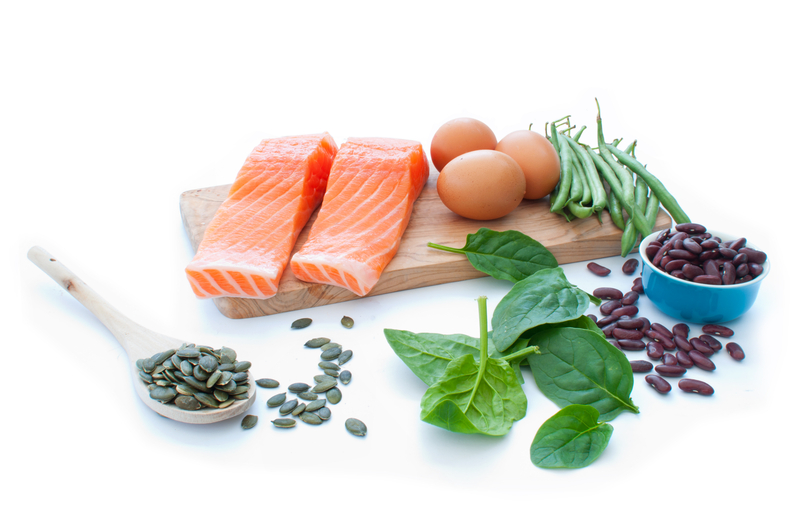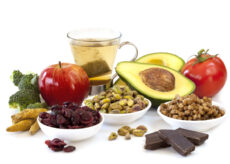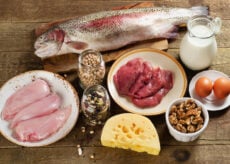The Top 8 Low-Carb Protein Foods For Weight Loss

High protein, low carb: This eating pattern has been the gold standard of dieting for years, and it’s not going anywhere any time soon. With such a recognized dietary behavior, odds are you have heard of or maybe even tried it, hopping on the low-carb bandwagon before. Today, this eating style is best known for its ability to fit easily into many popular eating patterns, such as the modified ketogenic diet, paleo diet, and many others. Although it may take on new shape every few years, the concept of it remains the same—swap out much of your daily carb intake and eat more protein instead.
Commonly, a diet that’s low in carbohydrates has a daily limit of 20 to 60 grams of carbs. Further, the general recommendation for protein intake ranges from 0.8 g – 1.2 g per kilogram of body weight or, for high-protein diets, 1.2 – 1.6 grams per kilogram. Nonetheless, like all things involving our bodies, there is no one-size-fits-all approach to a high-protein, low-carb plan, so it may take a little experimenting before determining what ranges work best for you.
Whether you have given it a shot or not, this eating pattern has maintained its attractiveness for decades due to the associated health benefits. Studies have shown time and again that lower carbohydrate diets are favorable for many health concerns, including cardiovascular disease, elevated blood cholesterol and triglycerides, high blood pressure, and increased body weight. In addition, low-carb protein diets have been shown to boost metabolism and reduce appetite, to help folks maintain a healthy body composition.
Top 8 Low-Carb Protein Foods
If you’re new to the high-protein, low-carb pattern, you are often left with the question: What can I eat? If you have ever felt confused regarding what foods are classified as low-carb protein, you are not alone. Finding foods that align with your health goals can be challenging and intimidating, to say the least. Fear not. Below are some of our top low-carb protein foods to steer you in the right direction.
1. Nuts & Seeds
Nuts and seeds are low-carb snacks that offer plenty of protein. In particular, peanuts, cashews, almonds, and pumpkin seeds are great go-to’s for high-protein snacks. Furthermore, nuts and seeds are high in fiber, which can help you feel fuller for longer.
2. Eggs
Eggs are notorious for their protein content with one egg offering up six grams of complete protein. Even more, eggs are loaded with vitamins, minerals, high-quality protein, and good fats. It’s important to eat the entire egg, though, and not just the white, as many of an egg’s nutrients are found in the yolk, including the antioxidants lutein and zeaxanthin.
3. Fish
Certain types of seafood are low-carb protein powerhouses, including wild salmon, pacific sardines, rainbow trout, and Atlantic mackerel. Fatty fish, in particular, can also help you get essential omega-3 fatty acids important for healthy arteries, reduced inflammation, and a healthy brain.
4. Cheese
Cheese lovers rejoice! Cheese is a favorite among low-carb dieters, and many even contain healthful amounts of protein. Some good options are ricotta cheese, mozzarella, and cottage cheese. For example, in a 5-ounce serving of 2% fat cottage cheese, you can get about 15 grams of protein and just 7 grams of carbohydrates.
5. Beans & Legumes
Beans and legumes may appear to be a “high-carb” food choice, but some beans and legumes can be low in net carbs. Net carbs are equal to total carbohydrates minus the amount of fiber because we do not digest the carbohydrates found in fiber. So, net carbs simply refers to carbs that are absorbed by the body. Some beans and legumes low in net carbs include soybeans, mung beans, lentils, black-eyed peas, great northern beans, black beans, lima beans, and navy beans. Beans and legumes are also full of fiber, which can help you feel fuller longer.
6. Leafy Greens
Dark leafy greens are one of the most powerful sources of vegetable proteins around. For instance, a 10-ounce portion of spinach has about 8 grams of protein, 10 ounces of collards have over 8.5 grams of protein, and a 10-ounce serving of kale has over 12 grams of protein.
7. Greek Yogurt
To many people’s surprise, Greek yogurt is an excellent low-carb protein option. Plain Greek yogurt contains four grams of carbs and nine grams of protein. When buying Greek yogurt, beware of added sugars and always make sure to check the list of ingredients for added strains of live bacteria for additional gut health benefits.
8. BioTRUST® Low Carb Protein Powder Blend
BioTRUST Low Carb Protein Powder Blend is the best in class when it comes to high-protein, low-carb foods. With 24 filling grams of clean, natural, pasture-raised, grass-fed protein and just 4 grams of net carbs, BioTRUST Low Carb protein is an easy go-to choice any time of the day.
Low-carb protein foods don’t have to be complicated, and there are plenty of great choices, so anyone can find options to fit into their dietary pattern. Remember that these foods just skim the surface of what is available when looking for healthful low-carb protein foods. Once you become comfortable with these low-carb protein staples, don’t be afraid to get creative and figure out the best way to incorporate them into your eating routine to meet your goals.







